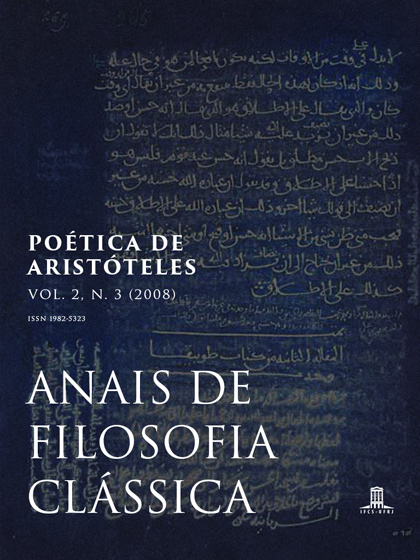Poetas e filósofos segundo Aristóteles
DOI:
https://doi.org/10.47661/afcl.v2i3.17036Palavras-chave:
Aristóteles. poética. mímesis. filósofo. logos.Resumo
Resumo:
As célebres definições do ser humano como animal político e como animal que possui logos, contidas na Política de Aristóteles, se entrelaçam de tal maneira que aquele que é definido apenas como o mais político dos animais acaba por ser o animal verdadeiramente político, na medida em que pensa e possui linguagem. Por conseguinte, o logos transforma a política humana em uma política de tipo especial e específico. Na Poética de Aristóteles ocorre algo semelhante em relação à definição do homem como o animal mimético, ainda que não explicitamente. Ali, o ser humano, que é inicialmente apenas o mais mimético dentre os animaismiméticos, se tornará o animal verdadeiramente mimético, se for notado que o seu mimetismo está necessariamente ligado ao aprendizado. Por outro lado, é de se notar também que Aristóteles, na Poética, caracteriza os poetas como os mais miméticos dentre os homens, e os filósofos como os que mais se deleitam com o aprendizado, embora todos os homens experimentem alguma espécie de prazer com ele. Buscar-se-á, neste artigo, compreender como e por que ocorre esse evidente paralelismo. Para tanto, será feito um desvio pelo De Anima aristotélico ou, mais especificamente, pelas partes do tratado que investigam o funcionamento da sensação humana, comparando-a com a sensação animal e formando uma escala simultaneamente contínua e descontínua entre aísthesis e logos.
Palavras-chave: Aristóteles. poética. mímesis. filósofo. logos.
Abstract:
The well-known definitions of human beings as political animals, as well as animals that possess logos - both appearing in Aristotle's Politics - intertwine at a point that those who are defined solely as the most political of the animals end up being defined as the only animals who are really political, as long as they think and possess language. In conclusion, logos transforms human politics into a special and specific type of politics. In Aristotle's Poetics something similar occurs -- yet not explicitly - in relation to the definition of human beings as mimetic animals. In that treaty, human beings, which are not the only, but the most mimetic animals, finish being understood as the only animals which are really mimetic, if it is noticed that its mimetism is necessarily linked to its ability to learn and think. On the other hand, it is evident also that, in Poetics, Aristotle defines poets as the most mimetic between human beings, and philosophers as the ones most capable of taking pleasure in learning (although every man is able to take some kind of pleasure in it). I this article, we will try to understand how and why happens this evident similarity. In order to accomplish it, we will make reference to De Anima treaty, or, more specifically, to those parts of the treaty that analyze human sensation, comparing it to animal sensation and constructing a scale between aesthesis an logos which contains simultaneously continuity and discontinuity.
Keywords: Aristotle. poetics. mimesis. philosopher. logos.


